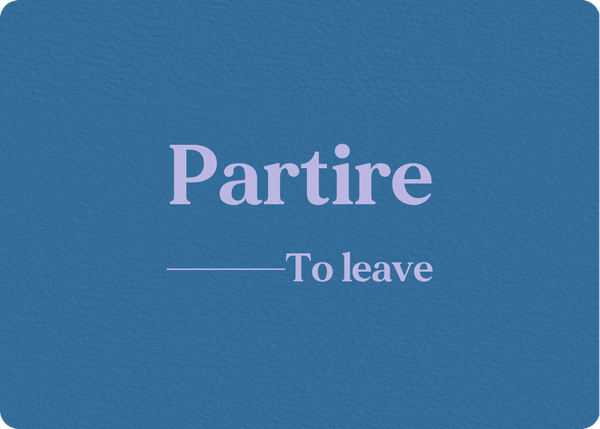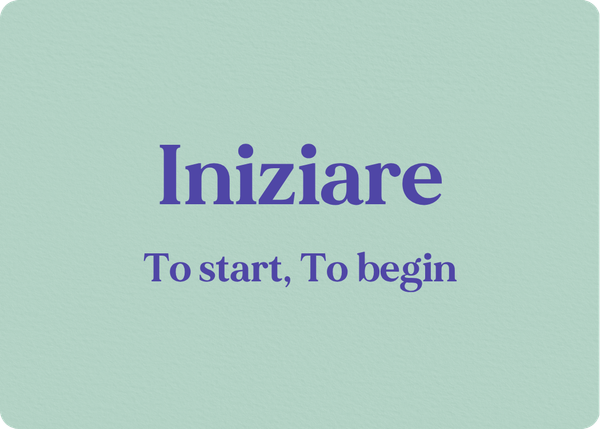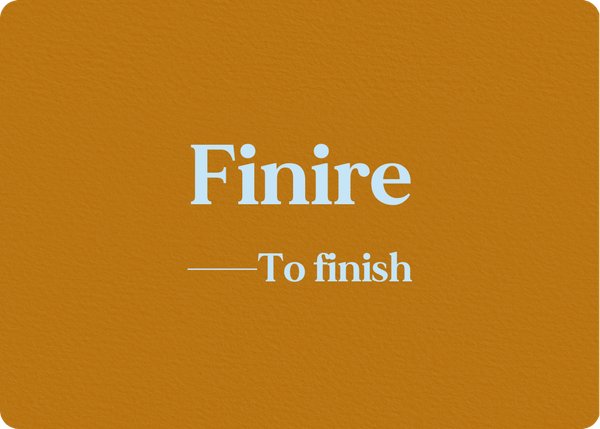What is Partire?
Partire is an Italian verb meaning "to leave", "to depart", or "to set off". It belongs to the third conjugation (-IRE verbs) and follows regular conjugation patterns. This verb is useful for everyday Italian conversation, from discussing travel and departures to expressing the beginning of journeys and movements.
Key Features of Partire:
- Type: Regular third conjugation verb (-IRE)
- Meaning: To leave, to depart, to set off, to start
- Auxiliary verb: Uses "essere" (to be) for conjugation in compound tenses
- Past participle: Partito
Indicativo – Indicative Mood
Presente (Present Tense)
| Person | Conjugation |
|---|---|
| io | parto |
| tu | parti |
| lui/lei | parte |
| noi | partiamo |
| voi | partite |
| loro | partono |
Example:
Quando parti per Torino?
When are you leaving for Turin?
Passato Prossimo (Present Perfect)
| Person | Conjugation |
|---|---|
| io | sono partito/a |
| tu | sei partito/a |
| lui/lei | è partito/a |
| noi | siamo partiti/e |
| voi | siete partiti/e |
| loro | sono partiti/e |
Example:
Sono partita da casa alle sette.
I left home at seven.
Imperfetto (Imperfect)
| Person | Conjugation |
|---|---|
| io | partivo |
| tu | partivi |
| lui/lei | partiva |
| noi | partivamo |
| voi | partivate |
| loro | partivano |
Example:
Ogni estate partivamo per la Grecia.
Every summer we used to leave for Greece.
Trapassato Prossimo (Past Perfect)
| Person | Conjugation |
|---|---|
| io | ero partito/a |
| tu | eri partito/a |
| lui/lei | era partito/a |
| noi | eravamo partiti/e |
| voi | eravate partiti/e |
| loro | erano partiti/e |
Example:
Quando hai chiamato, ero già partito per l'aeroporto.
When you called, I had already left for the airport.
Passato Remoto (Simple Past)
| Person | Conjugation |
|---|---|
| io | partii |
| tu | partisti |
| lui/lei | partì |
| noi | partimmo |
| voi | partiste |
| loro | partirono |
Example:
Partì all'improvviso, senza avvisare.
He/She left suddenly, without warning.
Trapassato Remoto (Past Anterior)
| Person | Conjugation |
|---|---|
| io | fui partito/a |
| tu | fosti partito/a |
| lui/lei | fu partito/a |
| noi | fummo partiti/e |
| voi | foste partiti/e |
| loro | furono partiti/e |
Example:
Dopo che fu partito, la casa sembrò vuota.
After he had left, the house seemed empty.
Futuro Semplice (Simple Future)
| Person | Conjugation |
|---|---|
| io | partirò |
| tu | partirai |
| lui/lei | partirà |
| noi | partiremo |
| voi | partirete |
| loro | partiranno |
Example:
Partirò per Londra il mese prossimo.
I will leave for London next month.
Futuro Anteriore (Future Perfect)
| Person | Conjugation |
|---|---|
| io | sarò partito/a |
| tu | sarai partito/a |
| lui/lei | sarà partito/a |
| noi | saremo partiti/e |
| voi | sarete partiti/e |
| loro | saranno partiti/e |
Example:
Quando arriverai, Silvia sarà già partita.
When you arrive, Silvia will have already left.
Congiuntivo – Subjunctive Mood
Presente (Present Subjunctive)
| Person | Conjugation |
|---|---|
| che io | parta |
| che tu | parta |
| che lui/lei | parta |
| che noi | partiamo |
| che voi | partiate |
| che loro | partano |
Example:
Spero che il treno parta in orario.
I hope the train leaves on time.
Passato (Past Subjunctive)
| Person | Conjugation |
|---|---|
| che io | sia partito/a |
| che tu | sia partito/a |
| che lui/lei | sia partito/a |
| che noi | siamo partiti/e |
| che voi | siate partiti/e |
| che loro | siano partiti/e |
Example:
Credo che Irene e Amedeo siano partiti ieri sera da Firenze.
I believe that Irene and Amedeo left Florence last night.
Imperfetto (Imperfect Subjunctive)
| Person | Conjugation |
|---|---|
| che io | partissi |
| che tu | partissi |
| che lui/lei | partisse |
| che noi | partissimo |
| che voi | partiste |
| che loro | partissero |
Example:
Desideravo che Orlando partisse con me.
I wanted Orlando to leave with me.
Trapassato (Past Perfect Subjunctive)
| Person | Conjugation |
|---|---|
| che io | fossi partito/a |
| che tu | fossi partito/a |
| che lui/lei | fosse partito/a |
| che noi | fossimo partiti/e |
| che voi | foste partiti/e |
| che loro | fossero partiti/e |
Example:
Se foste partiti con noi, vi sareste divertiti.
If you had left with us, you would have had fun.
Condizionale – Conditional Mood
Presente (Present Conditional)
| Person | Conjugation |
|---|---|
| io | partirei |
| tu | partiresti |
| lui/lei | partirebbe |
| noi | partiremmo |
| voi | partireste |
| loro | partirebbero |
Example:
Partirei oggi se facesse bel tempo.
I would leave today if the weather were nice.
Passato (Past Conditional)
| Person | Conjugation |
|---|---|
| io | sarei partito/a |
| tu | saresti partito/a |
| lui/lei | sarebbe partito/a |
| noi | saremmo partiti/e |
| voi | sareste partiti/e |
| loro | sarebbero partiti/e |
Example:
Saresti partito anche senza di me?
Would you have gone even without me?
Imperativo (Imperative)
| Person | Conjugation |
|---|---|
| (tu) | parti |
| (lui/lei) | parta |
| (noi) | partiamo |
| (voi) | partite |
| (loro) | partano |
Example:
Parti subito se vuoi arrivare in tempo!
Leave right away if you want to arrive on time!
Indefinite Moods
Infinito (Infinitive)
- Presente (Present): partire (to leave/to depart)
- Passato (Past): essere partito/a (to have left)
Examples:
Devo partire per lavoro.
I have to leave for work.
Dopo essere partito, ho capito di aver dimenticato il portafoglio.
After leaving, I realized I had forgotten my wallet.
Participio (Participle)
- Passato (Past): partito (left/departed)
Example:
Il treno partito da Milano è arrivato con dieci minuti di anticipo.
The train that left from Milan arrived ten minutes early.
Gerundio (Gerund)
- Presente (Present): partendo (leaving/departing)
- Passato (Past): essendo partito/a (having left)
Examples:
Partendo da qui, ci vogliono due ore per arrivare.
Leaving from here, it takes two hours to arrive.
Essendo partita di notte, trovò le strade completamente deserte.
Having left at night, she found the streets completely deserted.
The verb Partire at a glance: Key tenses you need
| Present | Present Perfect | Imperfect | Present Subjunctive | Imperfect Subjunctive | Present Conditional |
|---|---|---|---|---|---|
| io parto | io sono partito/a | io partivo | che io parta | che io partissi | io partirei |
| tu parti | tu sei partito/a | tu partivi | che tu parta | che tu partissi | tu partiresti |
| lui/lei parte | lui/lei è partito/a | lui/lei partiva | che lui/lei parta | che lui/lei partisse | lui/lei partirebbe |
| noi partiamo | noi siamo partiti/e | noi partivamo | che noi partiamo | che noi partissimo | noi partiremmo |
| voi partite | voi siete partiti/e | voi partivate | che voi partiate | che voi partiste | voi partireste |
| loro partono | loro sono partiti/e | loro partivano | che loro partano | che loro partissero | loro partirebbero |
Conclusion
Mastering the conjugation of "partire" is useful for expressing departures, travel, and the beginning of journeys in Italian. As a regular third conjugation verb, it follows standard patterns throughout all tenses, making it straightforward to learn.
Remember the key points:
- Uses "essere" as auxiliary verb in compound tenses
- Regular third conjugation verb (-IRE) with standard patterns throughout all tenses
- Past participle is "partito"
- Essential for describing departures, travel, and movement away from a place
- Often paired with prepositions "per" (to/for) and "da" (from)
Keep practicing with real sentences and contextual examples to master this Italian verb!





